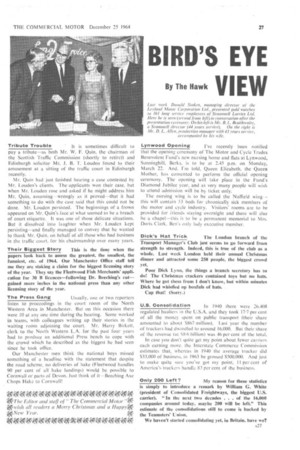BIRD'S EYE
Page 29

If you've noticed an error in this article please click here to report it so we can fix it.
By The Hawk VIEW It is sometimes difficult to pay a tribute—as both Mr. W. F. Quin, the chairman of the Scottish Traffic Commission (shortly to retire)) and Edinburgh scilicitor Mr. J. B. T. Louden found to their amusement at a sitting of the traffic court in Edinburgh recently.
Mr. Quin had just finished hearing a case contested by Mr. Louden's clients. The applicants won their case, but when Mr. Louden rose and asked if he might address him Mr. Quin, assuming—wrongly as it proved—that it had something to do with the case said that this could not be done. Mr. Louden persisted. The beginnings of a frown appeared on Mr. Quin's face at what seemed to be a breach of court etiquette. It was one of those delicate situations. But it dissolved into laughter when Mr. Louden kept persisting—and finally managed to convey that he wanted to thank Mr. Quin, on behalf of all those who had business in the traffic court, for his chairmanship over many years.
Tribute Trouble
Their Biggest Story This is the time when the papers look back to assess the greatest, the smallest, the funniest, etc. of 1964. Our Manchester Office staff tell me they are staking a claim for the biggest licensing story of the year. They say the Fleetwood Fish Merchants' application for 30 B licences—following Dr. Seedling's cut— gained more inches in the national press than any other licensing story of the year.
The Press Gang Usually, one or two reporters
listen to proceedings in the court room of the North Western Area in Manchester. But on this occasion there were 10 at any one time during the hearing. Some worked in teams, with colleagues writing up their stories in the waiting room adjoining the court. Mr. Harry I3irkett, clerk to the North Western L.A. for the past four years had to produce an additional Press bench to cope withthe crowd which he described as the biggest he had seen since he took office.
Our Manchester men think the national boys missed something of a headline with the statement that despite the road scheme, no deliveries of hake (Fleetwood handles 90 per cent of all hake landings) would be possible to Cornwall or parts of Devon. just think of it—Beechirig Axe Chops Hake to Cornwall?
Lynwood Opening I've recently been notified
that the opening ceremony of The Motor and Cycle Trades Benevolent Fund's new nursing home and flats at Lynwood, Berls, is to be at 2.45 p.m. on Monday, March 22, And. I'm told, Queen Elizabeth, the Queen Mother, has consented to perform the official opening ceremony. The opening will take place in the Fund's Diamond Jubilee year, and as very many people will wish to attend admission will be by ticket only.
The nursing wing is to be called the Nuffield wing-this will contain 53 beds for chronically sick members of the motor and cycle industry. Visitors' rooms. areto be provided for friends staying overnight and there will also be a chapel--this is to be a permanent memorial to Mrs. Doris Clark, Ben's only lady executive member.
Dick's Hat Trick The Loudon branch of the Transport Manager's Club just seems to go forward from strength to strength. Indeed, this is true of the club as a whole. Last week London held their annual Chrisimas dinner and attracted some 250 people, the biggest crowd yet.
Poor Dick Lyon, the things a branch secretary has to do: The Christmas crackers contained toys but no hats. Where he got them from I don't know, but within minutes Dick had whistled up boxfuls of hats. .
Cap that! (Sorry.)
U.S. Consolidation In 1940 there were 26,408 regulated hauliers in the 'U.S.A. and they took 17-7 per cent of all the money spent on public transport (their share amounted to about $867 million). Last year the number of truckers had dwindled to around 16,000. But their share of the revenue fat $8•6 billion) was 46 per cent of the total.
In case you don't quite get my point about fewer carriers each earning more. the Interstate Commerce Commission estimates that, whereas in 1940 the average trucker did $33,000 of business, in 1963 he grossed $500,000. And just to make quite sure you've got my point, H. per cent of America's truckers handle 83 per cent of the business.
Only 200 Left ? My reason for these statistics
is simply to introduce a remark by William C. White (president of Consolidated Freightways, the biggest U.S. carrier). " In the next two decades . . . of the 16,000 companies around today, maybe 200 will be left." This estimate of the consolidations still to come is hacked by the Teamsters' Union.
We haven't started consolidating yet, in Britain, have we? A 2 7








































































